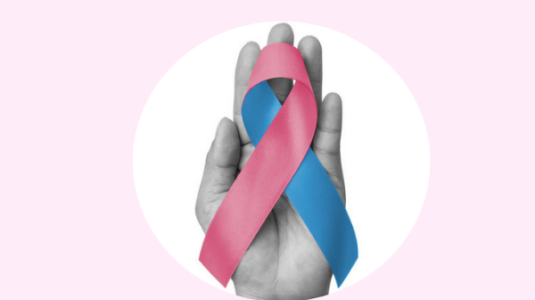
Understanding Infertility During National Infertility Awareness Week 2025
Head into #NIAW2025 knowing the definition of infertility, including its male factor and female factor causes, and how to support the 1 in 6 who are struggling to grow their families.
April showers bring May flowers… and it’s also when we honor National Infertility Awareness Week, a six-day long initiative to advocate for those who struggle to grow their families. This initiative was started in 1989 by RESOLVE: The National Infertility Association in an attempt to end the stigma and increase support and awareness for a disease that the World Health Organization (WHO) says affects one in six people globally at some point in their lifetime – that’s 17.5 percent of adults in the world.
But what is infertility? It’s more than just the inability to get or stay pregnant. Here, we’ll explain what infertility is, its common causes in men and women as well as impactful ways to support yourself or others while navigating the often long and winding road to parenthood during #NIAW2025, which runs from April 20-26.
DEFINITION OF INFERTILITY
Infertility is characterized by the inability to achieve a successful pregnancy after one year of regular, unprotected intercourse for individuals under the age of 35, or after six months for those older than 35.
In 2023, the American Society of Reproductive Medicine (ASRM) expanded the definition of infertility to include not just heterosexual couples, but also the LGBTQ+ community and/or those who have a specific medical-related diagnosis. This means infertility is seen now not just as a disease, but also as a “condition or status” that may require medical intervention – fertility treatment such as intrauterine insemination (IUI), in vitro fertilization (IVF), donor gametes or donor embryos – to have a baby (or babies).
Fortunately, advances in reproductive medicine have expanded treatment options for individuals facing infertility. Assisted reproductive technologies (ART) such as IUI, IVF, egg and sperm donation, surrogacy, and adoption make it possible for anyone to become a parent. Some people must work a little harder that others to get there.
CAUSES OF INFERTILITY
Ready for a brief ninth grade biology class recap? To naturally conceive (without medical intervention), three things need to happen:
- an ovary releases an egg into the fallopian tube
- sperm travels through the cervix and into the fallopian tube where it will fertilize that egg
- the fertilized egg (embryo) travels back down into the uterus and implants along the uterine lining.
Infertility (as it pertains to heterosexual couples) means something is awry somewhere in that process.
FACTORS THAT IMPACT INFERTILITY
Causes of infertility typically fall under one of three “buckets” – male factor, female factor, or unknown/unexplained.
MALE FACTOR INFERTILITY
Male factor infertility is a contributing cause in about 30 percent of fertility cases. This means the male partner’s sperm can’t successfully fertilize an egg. Male fertility testing, primarily done through sperm analysis (SA), can help determine a man’s reproductive potential because it tests four parameters; sperm count, sperm volume, sperm motility (movement) and sperm morphology (shape). Other factors affecting male fertility include:
- Structural abnormalities with the reproductive tract
- Sperm production disorders such as a varicocele or hormonal imbalance
- Ejaculatory disorders such as erectile dysfunction
Studies have found that lifestyle factors can affect male fertility too, including obesity, drinking and smoking, but many of these issues can be reversed. A reproductive endocrinologist or urologist can explain more.
FEMALE FACTOR INFERTILITY
Female factor is the cause of infertility in about 37 percent of couples. It’s more nuanced than male factor infertility because to achieve pregnancy, you need ovaries, fallopian tubes and a uterus to be in working order, so to speak. The different types of female factor infertility are:
- Ovulatory infertility, which makes up the majority of female factor infertility cases at about 25 percent. If your menstrual cycles are regular, typically between 24 and 34 days long, you’re likely to be ovulating. However, irregular or absent periods may suggest infrequent ovulation or anovulation, which can make getting pregnant each month spontaneously (without fertility treatment) more difficult or impossible.
- Tubal factor, conditions affecting the fallopian tubes. Unless you’re doing IVF, which bypasses the fallopian tubes, the tubes must be open and unobstructed for the egg and sperm to meet there.
- Peritoneal factor, which are irregularities affecting the peritoneum, of the lining of the pelvic and abdominal cavity. Conditions such as endometriosis, pelvic adhesions (scar tissue) and pelvic inflammatory disease (PID) fall under this category.
- Uterine factor, which means issues with the uterus. Some uterine issues are congenital, such as being born with a bicornuate uterus, and others are acquired, like uterine fibroids, polyps or Asherman’s syndrome (uterine scarring).
- Cervical factor, or issues within the cervix, may affect your ability to conceive, although these typically aren’t the sole cause of infertility, and aren’t as common.
- Age, since the ability to get pregnant and stay pregnant gets harder as we get older. Both the quality and the quantity of eggs decrease with time, which is why freezing your eggs and preserving your fertility when your eggs are still young and healthy makes it easier to grow your family when you’re ready.
MISCELLANEOUS CAUSES OF INFERTILITY
- Unexplained infertility, which affects about 30 percent of couples facing infertility. This means all standard fertility tests for both partners have come back normal, and there’s no identifiable cause for why they’re having trouble getting or staying pregnant.
- Medical conditions can affect the ability to conceive, including challenges with ovulation due to polycystic ovarian syndrome (PCOS), autoimmune disorders, obesity and sexually transmitted diseases (STD), to name a few.
- Genetic abnormalities, which includes the congenital issues mentioned above or genetic diseases that one of both partners carry that can be passed onto their children.
NATIONAL INFERTILITY AWARENESS WEEK 2025
Now that you know what infertility is for a medical standpoint, hopefully it will be easier for you to understand the struggle that 1 in 6 people are facing, or help you feel less alone if you’re that “one” in your friend group or family. Infertility is a medical diagnosis.
Infertility takes an emotional toll as much as physical one. Being diagnosed with infertility can lead to psychological issues, including feelings of grief, shame, guilt, anxiety, and depression. Couples may experience strain in their relationships and social isolation as they navigate the challenges of infertility on their own. The goal of NIAW is to help break the stigma of infertility, and to make people going through it feel less alone and more supported.
MENTAL HEALTH TIPS FOR INFERTILITY
Yes, navigating infertility can be daunting. Luckily, there are strategies to help you cope with its emotional challenges. Here are some to consider:
- Seek social support. Reach out to friends, family members or fertility-specific support groups who can offer empathy, understanding and encouragement. Be clear about what you need as you embark on your journey, whether that’s a vent session, advice, a distraction of some great takeout to cheer you up. Connecting with others who are on a similar journey can provide a sense of community and validation. This week, for example, check out the hashtag #NIAW and #NationalInfertilityAwarenessWeek on socials to read other people’s stories and words of encouragement.
- Prioritize self-care. Taking time for self-care activities can nurture your physical, emotional and mental well-being. Whether it’s practicing mindfulness throughout your day, engaging in creative hobbies or enjoying nature (or some really bingeable TV, no judgement), find activities that replenish your spirit and reduce stress.
- Set boundaries. It’s okay to set boundaries with others, especially when it comes to well-meaning but potentially insensitive comments or inquiries about family planning. And the unsolicited advice about getting pregnant such as, “just relax and it’ll happen!” is the absolute worst! Advocate for your emotional needs and politely decline to discuss sensitive topics if you’re not ready.
- Reach out for professional support. Consider seeing a therapist or counselor who specializes in infertility-related issues. Professional counseling can provide a safe space to process complex emotions, develop healthy coping strategies and cultivate resilience on your fertility journey.
- Book a consultation with a fertility specialist. Understanding your body through medical history and testing, discovering potential causes of fertility challenges and creating a plan to achieve your family planning goals can relieve stress. Reach out to us here at Extend Fertility to set up your initial consultation with one of our board-certified providers, who can run initial testing, talk you through your options and get you started with the fertility treatment that’s right for you, if necessary.
Infertility is a multifaceted journey and honestly, it can be a lot. By understanding what infertility is at its core, raising awareness, fostering open dialogue and implementing strategies to support mental and emotional well-being, we can create a more compassionate and inclusive environment for individuals and couples facing infertility.
If you want to learn more about your reproductive potential, book your consultation, or have questions about the process, let’s talk! Extend Fertility’s infertility and IVF services and egg freezing services are here when you’re ready. You got this.




